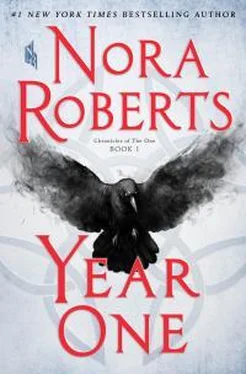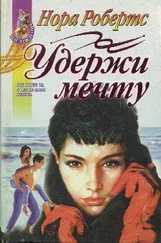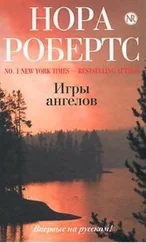“What’s this interview bull?”
“I want to go on with a story, a personal one. I want people to hear—not from me, but from someone who’s getting through this. I want to go on with that story. Because it matters. It’s about all that matters now.”
“You want to tell a story?”
“I want you to tell yours,” Arlys corrected. “I want you to speak to and for all the others out there, hanging on. What you think, what you feel, what you’ve done. Maybe one person hears it, and it helps them hang on.”
“Talk to her, T.J. It’s the right thing to do.”
“No names,” Arlys added. “I’ll call you something else. No location. I won’t say where we spoke. I have a recorder with me. Anything you say is off the record, I turn it off.”
“You’re going to go on with this tonight?”
“I’m going to ask to go on with it when I get back, ask for it to run every hour until the evening report. Tomorrow, if I can, I’m going to try to talk to someone else, get their story, and do the same thing. This isn’t going to be the end because we’re not going to let it be the end. The Raiders aren’t going to pick us clean. We’re going to get through. I want you to tell me how you did, how you are.”
“You want to hear my story? I’ll tell you my story.”
“Can I get my recorder? And my flashlight?”
“Go ahead.”
She reached in her briefcase, found the flashlight by feel, took her recorder out of her pocket before turning the light on, aiming it in the direction of T.J.’s voice.
A big guy, she thought, a broad-shouldered black man with fierce black eyes. The stubble thickening on his head told her he’d likely shaved it routinely until recently.
“You’ll call me Ben.”
“All right, Ben. I’m turning on the recorder. This is Arlys Reid. I’m speaking to Ben. I’ve asked him to tell me, tell all of us, his story. The pandemic has changed everything for everyone. How do you cope?”
“You get up in the morning, and do what you have to do. You get up, thinking for just a split second, everything’s the way it was. Then you know it’s not. It’s never going to be, but you get up and keep going. Three weeks and two days ago, I lost my husband. The best man I ever knew. A police officer, decorated. When things started to go bad, he went out every day, trying to help people. To serve and protect. It cost him his life.”
“He was killed in the line of duty?”
“Yeah, he was. But not by a bullet or a knife. That would’ve been easier for him. He got infected, he got sick. By that time, the hospitals were so overloaded … He wouldn’t go. No point in it, he told me. He wanted to die at home, in our home. His worry was he’d infected me, but I didn’t get sick.”
He paused a minute, seemed to gather himself.
“I did everything I could for him, for two terrible days. Two days, that’s all it took when we realized we couldn’t keep pretending it was just exhaustion from working doubles, but the Doom. I’m not going to talk about those two days. I’ll just say he died like he wanted. At home. And I took him … where I took him to rest.”
“I’m so sorry, Ben.”
“Everybody thinks their loss is the worst that can happen to them. And this, this fucking scourge, it’s taken from everybody. We all had the worst that can happen.”
“But you got through it. You’re still getting through it.”
“I wanted to die, too. I wanted to get sick and die, but I didn’t. I thought I could take his gun, take his service weapon, and that’d be a way to die. I thought about that while people were rioting in the streets, when people started acting like animals. And I thought of what he’d say to me, I thought how disappointed in me he’d be for not cherishing life, and doing something to help. And still, I wavered.”
He fell silent for nearly thirty seconds, but Arlys said nothing, gave him the time, the space.
“Where I live,” he continued, “the building, people were dying or running or going out to join the animals in the streets. I thought: There’s nothing left but the dark now. But I could hear my husband’s voice in my head saying: Don’t you do it. Don’t you give up.”
“And you didn’t.”
“Nearly did. I went out one day, started to. Maybe I’d get some food, maybe I’d just keep walking. I didn’t know. And there was a boy sitting on the stairs. He lived in the building. I didn’t know his name—I’m not going to say his name.”
“We’ll call him John.”
“All right. John was sitting there crying. Both his parents and his brother, all dead. He couldn’t stay in his apartment. You can imagine why.”
“Yes.”
“He thought I meant to harm him at first. He didn’t run. He was going to stand and fight, that scared, grieving little boy. He’d fight, and what was I doing but wallowing? So I sat down on the steps, and we talked awhile. I took his mama first, and we were going to take her to where I’d laid my husband. When we went out with her, somebody came up. I’m not going to say a name,” he added, but Arlys saw his gaze cut to Fred. “She asked if she could help us. She knew others who could help. So we got that help and we laid John’s family to rest.
“And he came to live with me. So we get up in the morning, and we have some breakfast. We do some reading, and some math and such. It’s important a boy still learns. I’m teaching him to fight, in case he needs to. We play games because play’s as important as learning. We get up and do what we have to do, and that’s how we get through it. When he’s ready—it’s only been a couple weeks—I’m going to get him out of the city. Get him out and find someplace clean. And we’ll get up in the morning there, and do what needs to be done. We’ll build a life, because death can’t be all there is.”
He looked at Arlys now, right into her. “This won’t be the end of it,” he said, repeating her words. “We won’t let it be the end of it.”
“Thank you, Ben. I hope your story reaches people who need to hear it. I needed to hear it. This is Arlys Reid, grateful for everyone who’s doing what needs to be done.”
She switched off the recorder. “Don’t wait until he’s ready. Get John out as soon as you can.”
“His name is Noah.” T.J.’s eyes flicked between the two women before fixing on her. “You know something you’re not telling.”
“I know it’s going to get worse here. I know if I had a child depending on me, I’d get him out. Fred said there are people who can help you with that. Pack and ask them to help you. You should go with them,” she said to Fred.
“I’ll stick with you. You know who to contact, T.J. Honest, if Arlys says you should go, you should go. For Noah.”
“I’ll go talk to him. He knows it’s coming. I’m going to miss you, Fred.”
He moved over, wrapped arms around her, towering over her.
“Miss you back, and Noah. But, you know, if it’s meant, we’ll find each other again.”
“I want it to be meant.” He held out a hand to Arlys. “I thought it would make me angry to tell my story. It didn’t. Watch out for yourself.”
“I intend to. Good luck, T.J.”
He picked up the bag he’d brought in to gather supplies, took one last look, and slipped out through the boards.
“It’s going to be a good segment. A powerful one. I think he was here because he needed to tell his story, and he needed you to tell him to get Noah and go.”
“Lucky all around.”
“Not lucky. Meant. I have something to tell you—off the record.”
“Okay, let’s grab that soup, and you can tell me on the way back to the station. I want to put this together.”
“I really better show you, and here, where it’s safe. Don’t freak, okay?”
Читать дальше












